Brand new for Love Your Zoo and Love Your Aquarium 2024, the New World Animal Day bracket competition will be a friendly contest to give one animal a much-deserved annual spotlight. There are many world animal days, but none yet initiated by BIAZA - have your say in which will be the first!
Updates:
On Monday, the scimitar-horned oryx and Critically Endangered Somali wild ass both managed to outcompete Andean bears and white-clawed crayfish. Both received a healthy pile of votes: the oryx receiving 421, and wild ass accruing 320.
On Tuesday, after a very tight competition between lumpsuckers and songbirds, the birds eked out with just 15 extra votes, getting 225 in total. The mice also outsqueaked the lungfish with 282 total votes, bringing both harvest mice and songbirds to the second Semi Final (today's vote)
And on Wednesday, Endangered African ungulates were head-to-head in the first semi final. Once again the scimitar-horned oryx came ahead, with 370 total votes. Yesterday's semi final saw harvest mice eke ahead of songbirds, with 308 votes to the birds' 253.
Which brings us to the final! Vote for the winner, as before - you can only vote today.
Vote:
The entries were submitted by BIAZA members who feature these creatures at their zoo/aquarium, and shortlisted to a final eight:
1. Andean bears
Submitted by: The BIAZA Bear Focus Group, Northumberland Zoo, & supported by Chester Zoo, Noah’s Ark Zoo Farm and Knowsley Safari
Proposed date from 2025 onwards: 25 June, Paddington Bear’s Birthday
- Out of the eight species of bear, this species receives little recognition.
- A keystone species and the only bear in South America.
- They are classed as Vulnerable and in decline, their populations and habitats are highly fragmented, and they face conflict with humans.
- Plus, research into their ecology is severely lacking.
- By protecting them we can maintain vast areas. Healthy bears means healthy ecosystems!
Vote for these overlooked bears during Round 1 on Monday 27 May
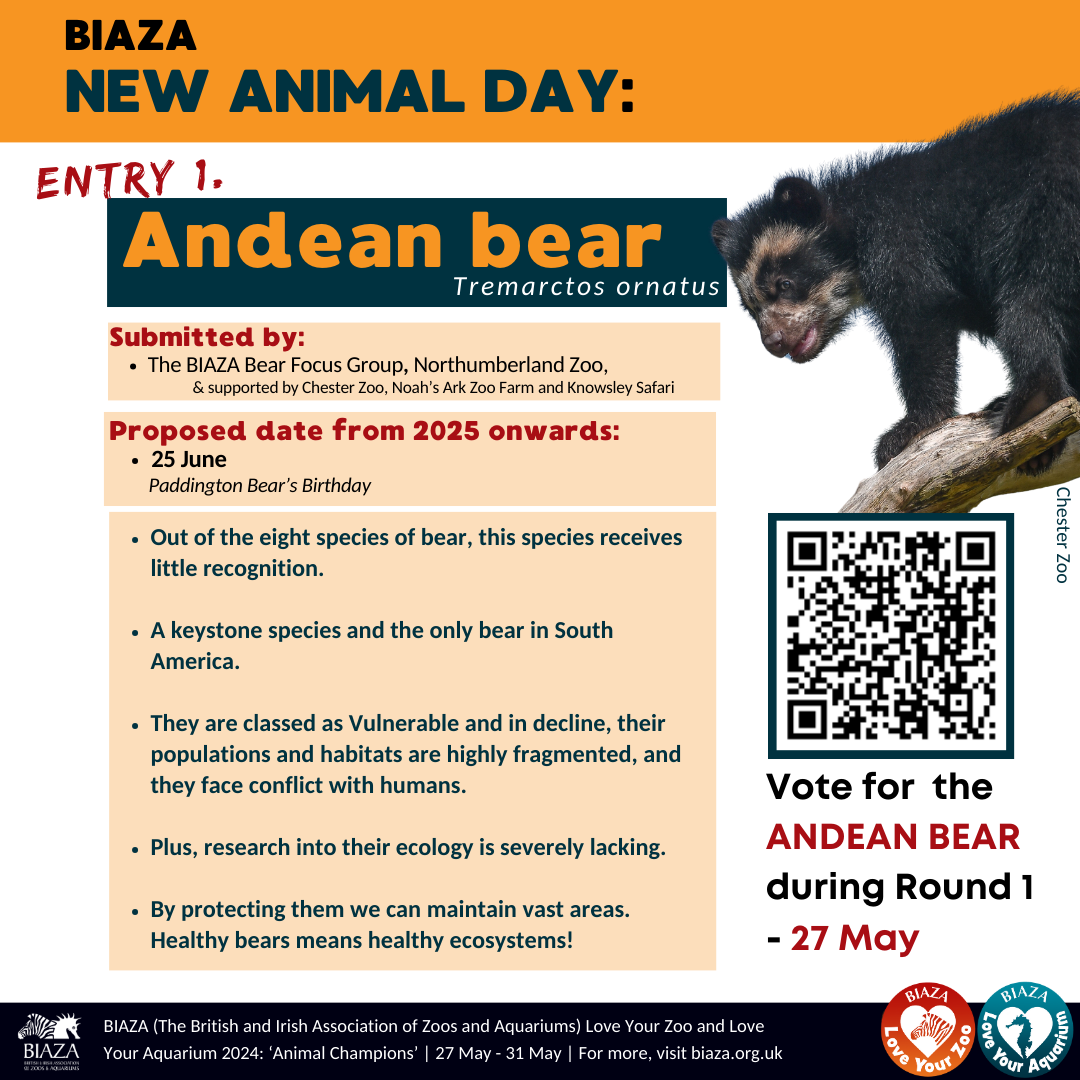
2. Somali wild ass
Submitted by: Knowsley Safari
Proposed date from 2025 onwards: July 18 - the 200th day of the year. Estimates suggest there are only 200 mature individuals left.
- The Somali wild ass is a testament to adaptation in harsh African environments
- They faces severe challenges, including limited access to water and food, as well as increasing hunting for food and medicinal purposes.
- Estimates indicate that just 200 mature individuals remain.
- The Somali wild ass is even more endangered than iconic species like the black rhino. Urgent action is imperative, before it’s too late.
Show your support for this highly endangered sub-species during round 1 on Monday 27 May.
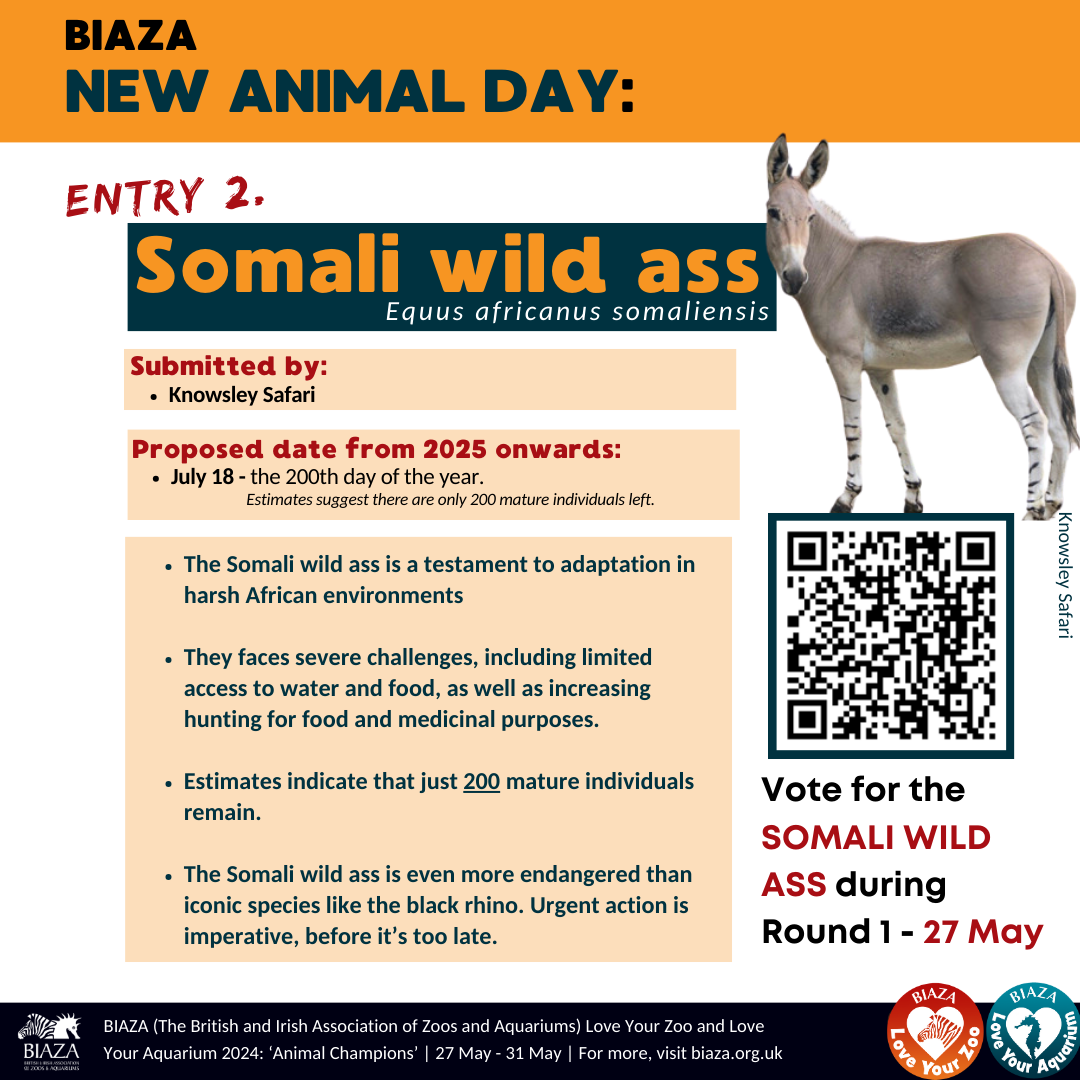
3. Scimitar-horned oryx
Submitted by: Marwell Wildlife
Proposed date from 2025 onwards: August 16 - summertime for a species adapted to arid environments
- This antelope was Extinct in the Wild in the early 1990s due to over-hunting, competition, and war.
- Luckily UK zoos engaged in a pioneering project to re-establish the species back in its natural habitat.
- Now, there are hundreds of free-ranging individuals northern Africa.
- Last December, the oryx was downlisted from ‘Extinct in the Wild’ to ‘Endangered.’
- This species represents what we can achieve when we work together and the real impact that zoos can have saving species.
Support the Scimitar-horned oryx during Round 2 - Monday 27 May
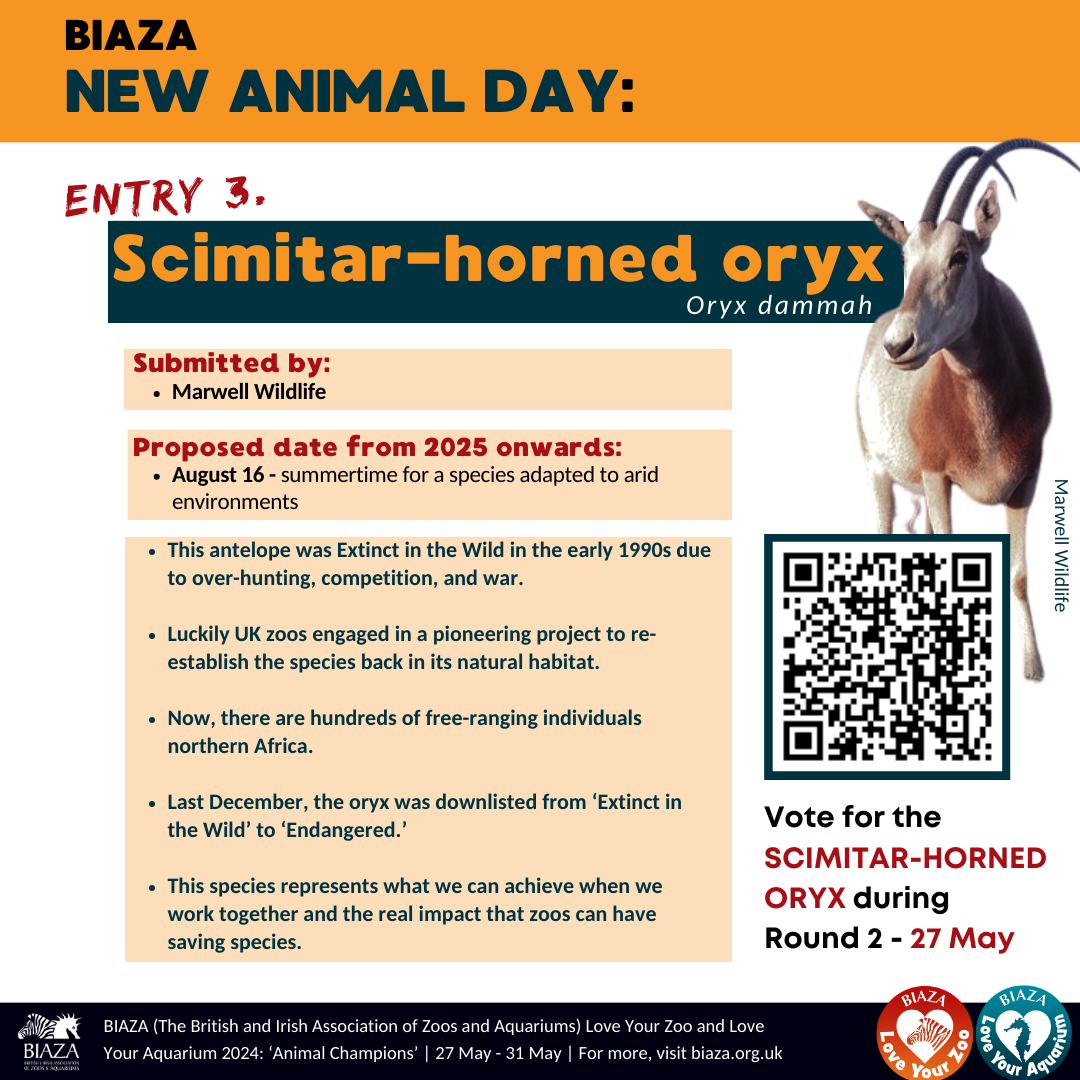
4. White-clawed crayfish
Submitted by: Wildheart Animal Sanctuary, Flamingo Land
Proposed date from 2025 onwards: The first Wednesday of August, traditionally ‘Kräftskiva’ (crayfish party) in Sweden.
- One of the UK’s largest freshwater invertebrates, they face threats from an invasive species: the signal crayfish.
- These invaders carry plague which the white-clawed crayfish has no resistance to.
- Several BIAZA zoos and aquariums, including Flamingo Land and the Wildheart Trust, are running or constructing hatcheries to give them a vital population boost.
- Raising awareness would encourage the public to follow simple steps such as to clean and dry clothing before and after entering water, reducing the spread of crayfish plague.
Support these threatened native invertebrates by voting during Round 2 - Monday 27 May
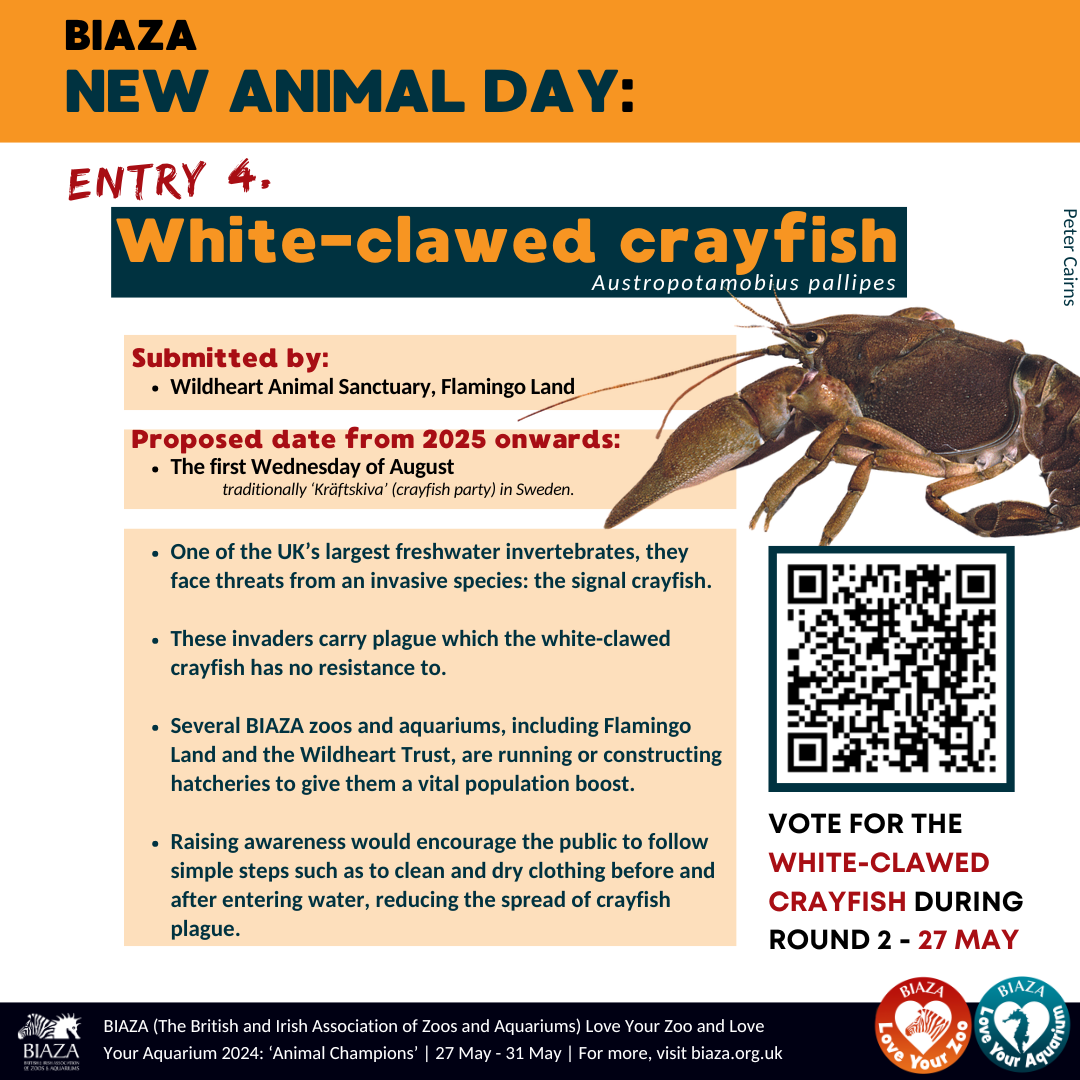
5. Lumpsucker
Submitted by: Galway Atlantaquaria
Proposed date from 2025 onwards: 7 October, one day before National Resilience Day
- An overlooked (and cute!) native species to the UK and Ireland.
- Overall numbers have declined in recent decades due to a fishing, bycatch and habitat destruction.
- Used in fish farms to eat sea lice off salmon and other valuable fish
- They have the potential to be ideal ambassadors to reflect marine conservation matters close to home.
- The species has also adapted to ‘hold’ onto rocks when the current is too strong, so they can represent resilience.
Support one of the cutest and unknown local fish species by voting during Round 3 on Tuesday 28 May
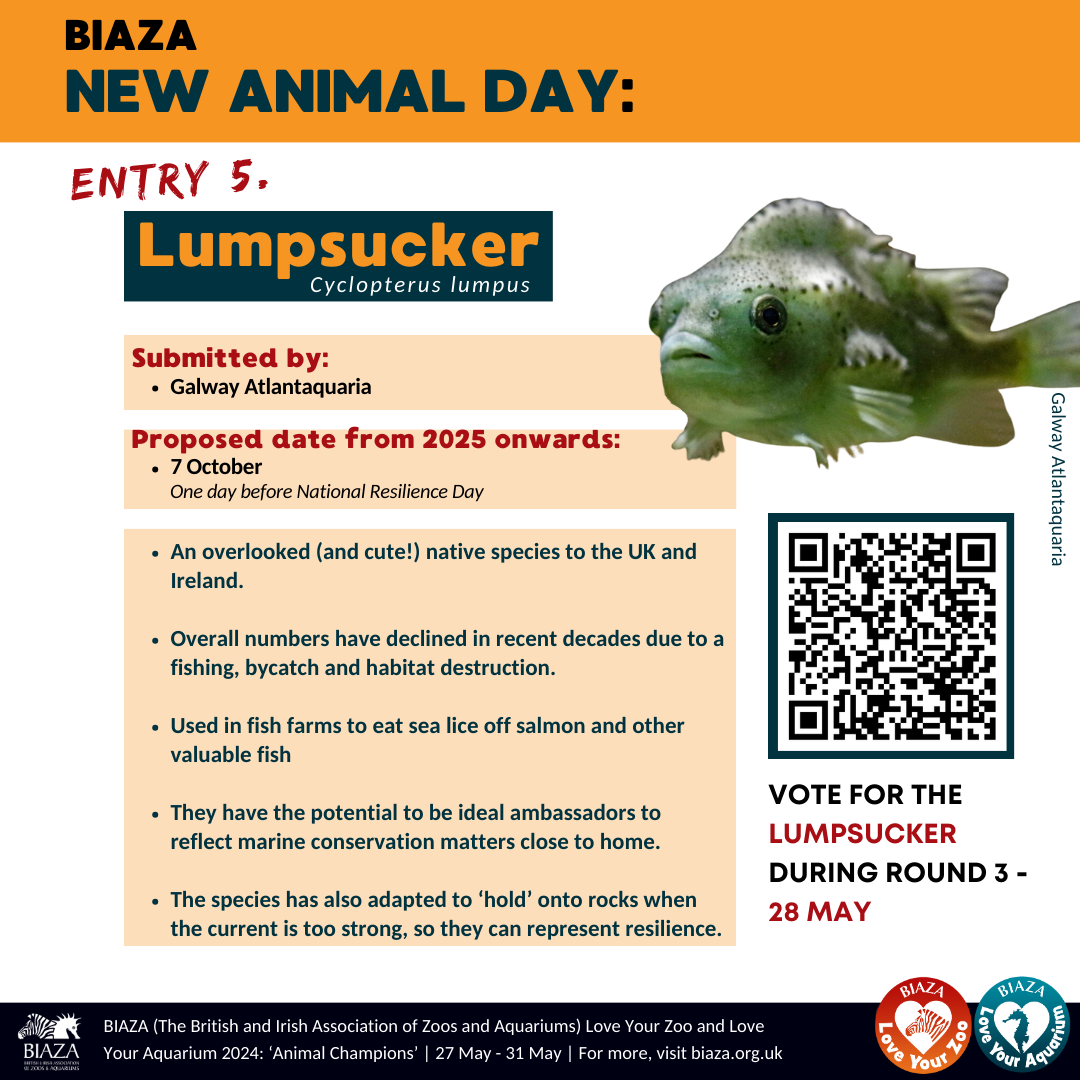
6. Songbirds
Submitted by: Birdworld
Proposed date from 2025 onwards: 5 May - Spring in full swing!
- This can include species such as the Bali Myna and Sumatran Laughingthrush, as well as native UK species like the robin and skylark.
- A group which bring such joy across the world, yet so many species are Endangered or Critically Endangered.
- For example, South-East Asian songbirds are bought and sold in singing competitions and desperately need our help.
- Certain BIAZA zoos like Birdworld collaborate for Bali Mynas, a near-extinct species, for breeding programmes and behavioural studies. This work provides an inspiring story of hope.
Give songbirds a voice by voting during Round 3 on Tuesday 28 May
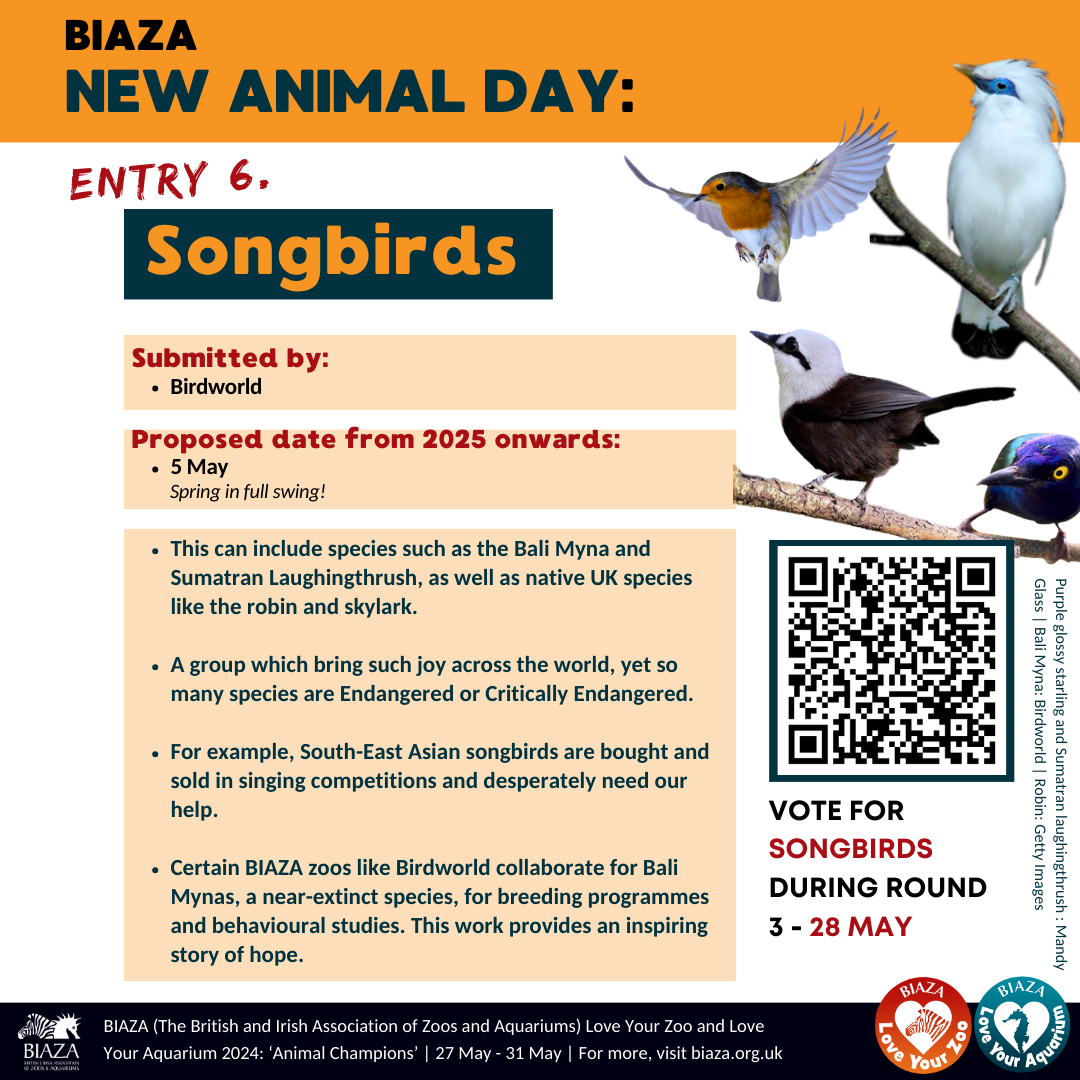
7. Harvest mouse
Submitted by: Woburn Safari Park
Proposed date from 2025 onwards: 1 November, the perfect time to survey for wild harvest mouse nests!
- Small but mighty! The harvest mouse is the only British mammal with a prehensile tail, and which builds nests of living woven grass.
- Distribution is now incredibly patchy due to fragmentation. In Scotland and Wales they are listed as Critically Endangered and Vulnerable respectively.
- Without good estimates of their numbers, we simply don’t know enough about harvest mice. The best way is through surveying.
- A day for this species will encourage surveys for nest sites and turn organisations and citizen scientists into mouseketeers.
Support the humble harvest mouse by voting in Round 4 on Tuesday the 28 of May
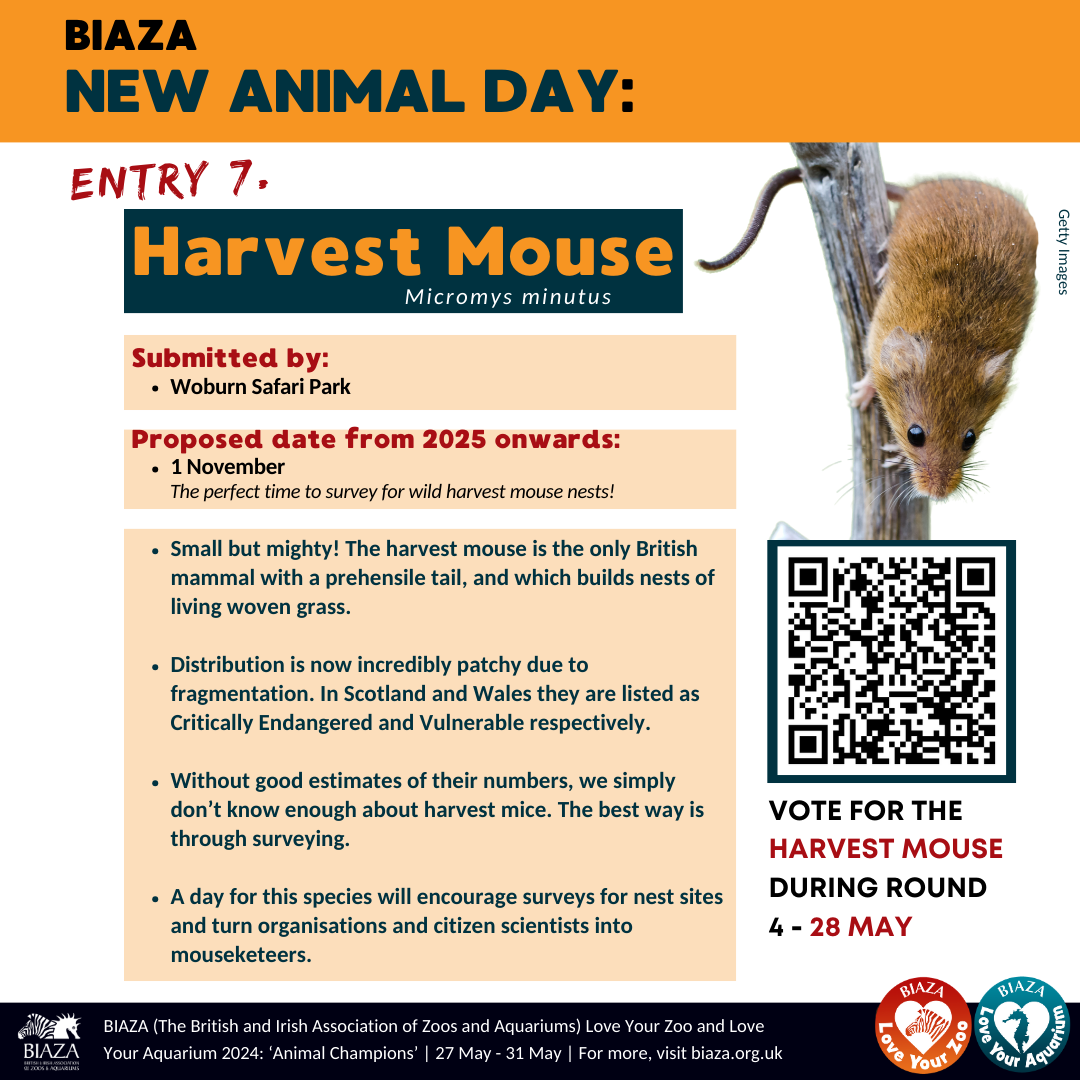
8. Lungfish
Submitted by: Lakeland Wildlife Oasis
Proposed date from 2025 onwards: 4 October - the oldest known fossil dates back 410 million years ago
- These fishes have a number of specialised features which set them apart from other fish, like muscled fins and lung structures for breathing air.
- They are an ancient group; over 410 million years old and as old as vascular plants.
- Sadly these relic fishes are facing severe threats from pollution, invasive species and dams/alterations to waterways.
- To lose creatures which have survived four mass extinctions would be a tragedy, and an international lungfish day would raise awareness for these incredible creatures.
Give lungfish some love by voting during Round 4 on Tuesday 28 May
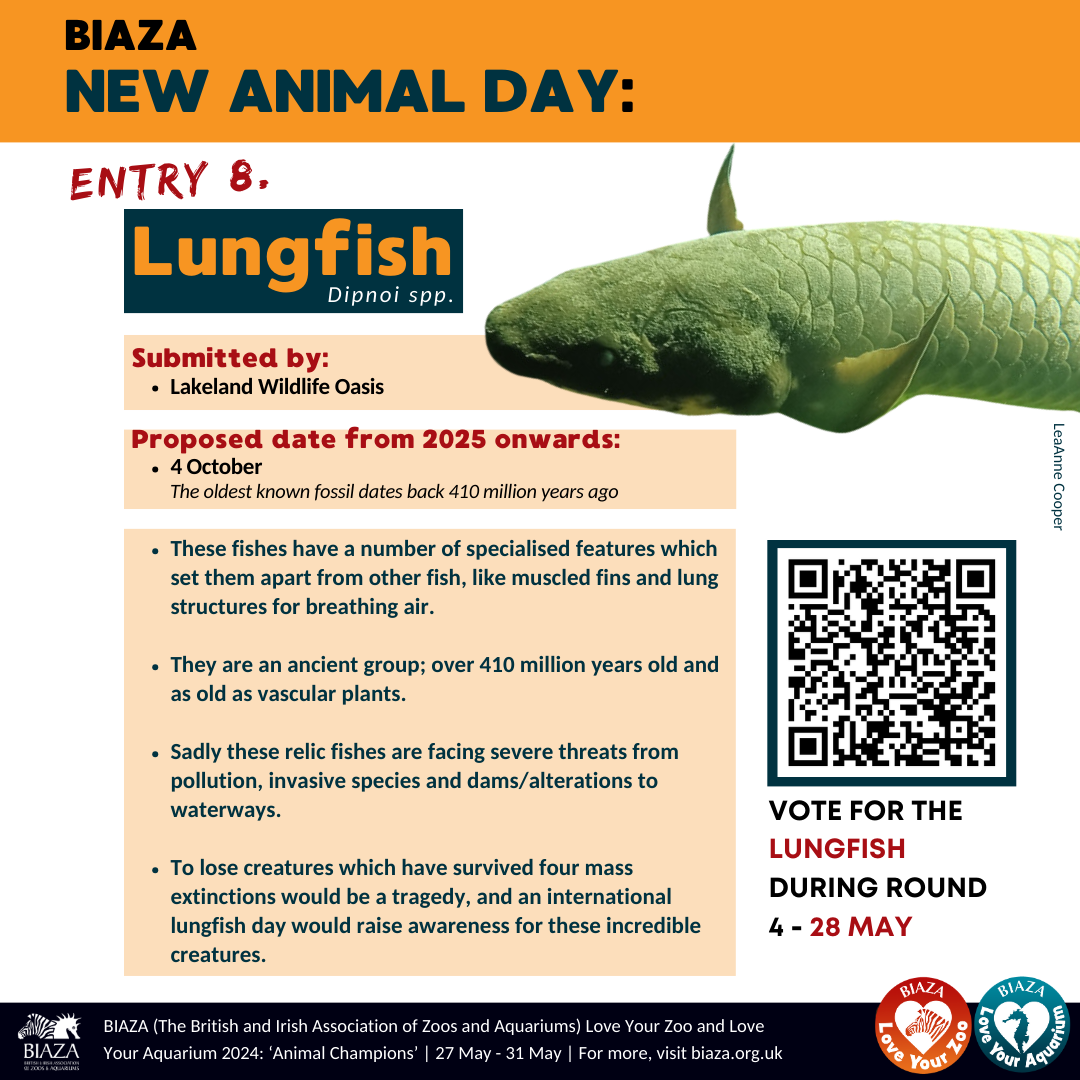
Related Members
-
News
.png?w=100&h=100&zc=1&f=jpeg&hash=a0b01e801771c24b4d7f5c3df4abed98) Twycross Zoo Welcomes Its First Baby of 2026: An Endangered Pileated Gibbon 19th February, 2026Conservation charity, Twycross Zoo, is celebrating a heart-warming milestone with the arrival of its first baby of 2026 - an endangered pileated gibbon,…
Twycross Zoo Welcomes Its First Baby of 2026: An Endangered Pileated Gibbon 19th February, 2026Conservation charity, Twycross Zoo, is celebrating a heart-warming milestone with the arrival of its first baby of 2026 - an endangered pileated gibbon,… -
News
.png?w=100&h=100&zc=1&f=jpeg&hash=c8eadb7dce959e1a8e6be51070cd0b3b) Conservation breeding success as Endangered spotted deer fawn is born at Bristol Zoo Project 19th February, 2026An extremely rare spotted deer fawn has been born at Bristol Zoo Project, marking another important conservation milestone for this Endangered species.…
Conservation breeding success as Endangered spotted deer fawn is born at Bristol Zoo Project 19th February, 2026An extremely rare spotted deer fawn has been born at Bristol Zoo Project, marking another important conservation milestone for this Endangered species.… -
News
.png?w=100&h=100&zc=1&f=jpeg&hash=60022dc0d0854fa23f80616d64c9376a) Sustainability in poetry - BIAZA Q&A with the author of The Rimba 17th February, 2026This week, BIAZA interviewed author Jane Griffiths and illustrator Emma Lokuciejewski on their recent book ‘The Rimba’ – a poetical…
Sustainability in poetry - BIAZA Q&A with the author of The Rimba 17th February, 2026This week, BIAZA interviewed author Jane Griffiths and illustrator Emma Lokuciejewski on their recent book ‘The Rimba’ – a poetical…



